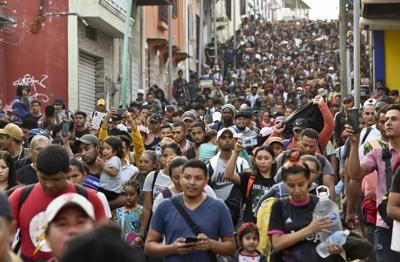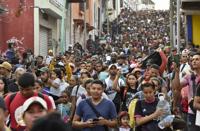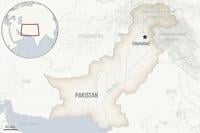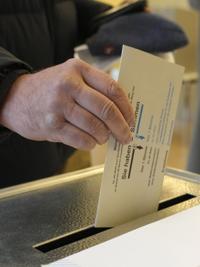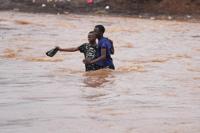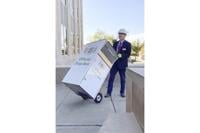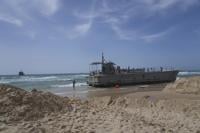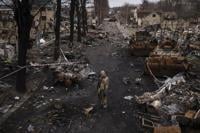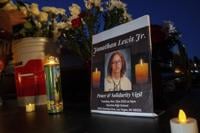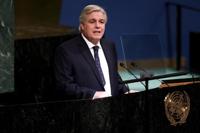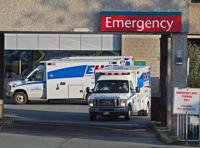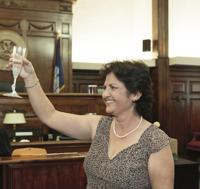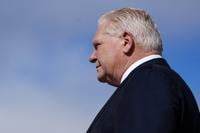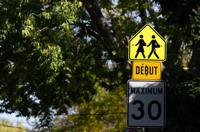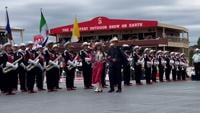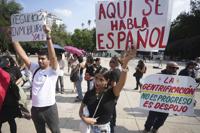TAPACHULA, Mexico (AP) — Mexico President Andrés Manuel López Obrador and Guatemala President Bernardo Arévalo were meeting Friday in this Mexican border city to tackle issues of shared interest, foremost among them immigration.
Arévalo, who took office earlier this year, noted that they were meeting in the same city where his father Juan José Arévalo, a former president of Guatemala, had met with his Mexican counterpart, Manuel Ávila Camacho, in 1946.
“We want a border that unites, a border that unites our people, the Mexican people and the Guatemalan people, a border that allows us to develop and grow together, with reciprocal benefit, trust, enthusiasm and collaboration,” Arévalo said.
But both countries are under pressure from the United States to increase control of their shared border to help control the flow of migrants north. The border also carries security concerns, as so many do.
Before their meeting – the first for the two leaders -- López Obrador said he was worried about security in the border area. Two Mexican cartels have been battling for control in the area, causing death and displacement in remote, rural areas as they try to assert control of the drug, migrant and weapons flows through the area. He said Guatemala was concerned too and the leaders would discuss how to address it.
The encounter also comes at a time of intense diplomatic activity between the United States and Mexico and with other countries in the region as the administration of U.S. President Joe Biden tries to get a handle before the November election on migration to the U.S.-Mexico border that reached record levels in late 2023.
Mexico Foreign Affairs Secretary Alicia Bárcena said Tuesday that Mexico, the United States and Guatemala are in agreement that they will direct more resources to the Mexico-Guatemala border, accelerate development programs, commerce and job creation. She also said Mexico would discuss issuing more temporary work visas to bring Guatemalan labor to Mexico.
Perhaps to that end, López Obrador announced Friday that Mexico plans to extend a cargo train line that spans a narrow isthmus its the south to the Guatemalan border. He also repeated his interest in eventually extending his Maya Train legacy project to Guatemala’s Peten jungle, something Arévalo’s predecessor declined.
For migrants headed north, the critical points in their journey tend to be the Darien Gap on the border of Colombia and Panama where 500,000 migrants – mostly Venezuelans – crossed last year and then again at the Mexico-Guatemala border.
Panama’s President-elect José Raúl Mulino has promised to shut down traffic through the Darien. To what extent he can remains to be seen.
On Friday, Panama’s outgoing immigration chief said the country was incapable of carrying out mass deportations.
“We can’t make it massive because of the high cost and the coordination you have to do with the other countries,” Samira Gozaine, director general of Immigration said. “If we could deport all of those who enter we would do it.”
Bárcena, Mexico’s foreign minister, said the shared Mexico-Guatemala-Belize border is also important. But it is similarly challenging to police.
The border is long, mountainous and remote, filled with blind crossings for migrants and their smugglers. Those are many of the same routes currently being disputed by the Jalisco and Sinaloa cartels.
“We want to make that border space an exemplary space … no walls,” Bárcena said. “The people should feel they entered a country that is pleasant, that can offer them opportunities.”
Migrants have typically found traversing Mexico anything but pleasant. They are repeatedly robbed and kidnapped by organized crime and systematically extorted by Mexican authorities, who in recent years have either tried to contain them in the south or return them there time and again until they exhaust their resources.
The same day Bárcena spoke, Carlos Campos, a Venezuelan travelling with his wife sister and nieces and nephews, was flown from Mexico City back to Tapachula after trying to hop a train north.
“They sent us back and we’re (north) again,” he said as they made their way out of Tapachula.
__
AP writers María Verza in Mexico City and Sonia Pérez D. in Guatemala City contributed to this report.

